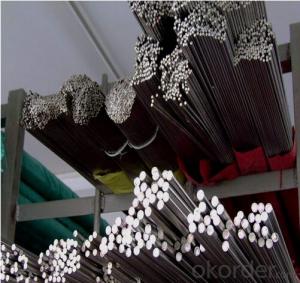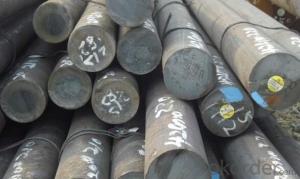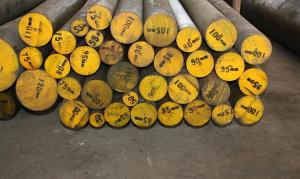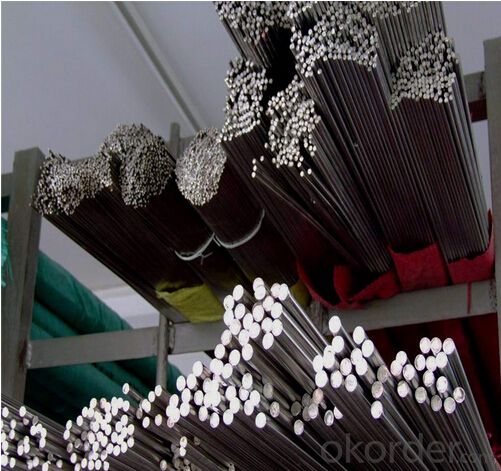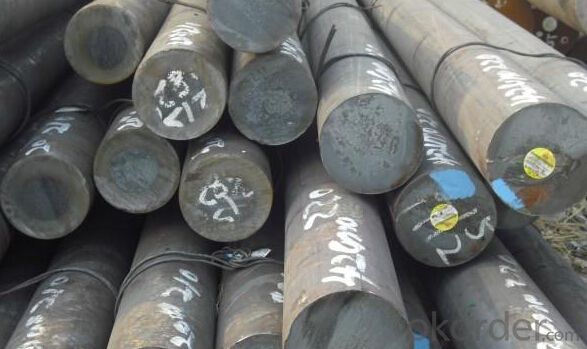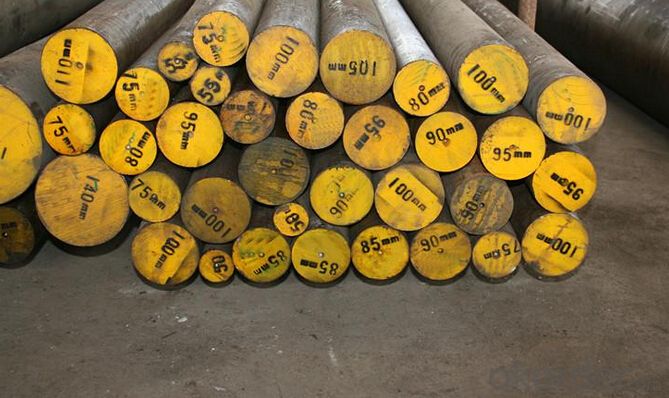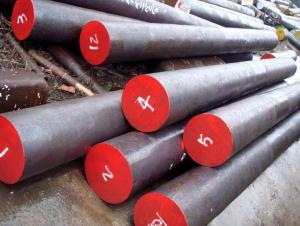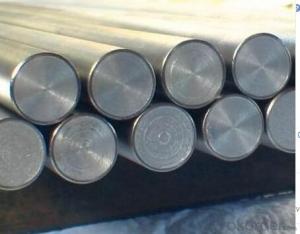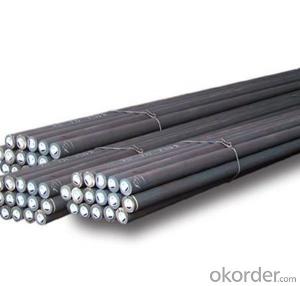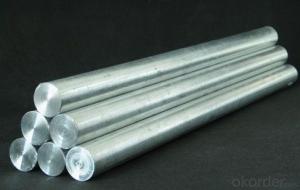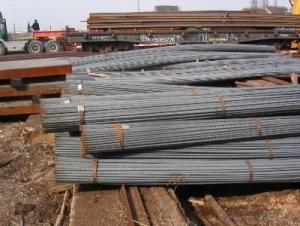GCr15 Bearing Steel Special Steel Carbon Steel
- Loading Port:
- China main port
- Payment Terms:
- TT OR LC
- Min Order Qty:
- 25 m.t.
- Supply Capability:
- 10000 m.t./month
OKorder Service Pledge
OKorder Financial Service
You Might Also Like
Specification
1.round steel
2.ISO9001:2008 certificate
3.Competive price and Best quality
4.On-time delivery
Chemical Composition(GB)%
C | Si | Mn | Cr | Cu | S |
0.95-1.05 | 0.15-0.35 | 0.25-0.45 | 1.4-1.65 | ≤0.20 | ≤0.020 |
Heat Treatment
Item | Temperature ℃ | Hardness |
Anneal | 790-810 | 170-207HB |
Quenching | 830-860 | 62-66HRC |
Tempering | 150-180 | 61-66HRC |
Characterstics
1.Uniform hardness,Good abrasion resistance |
2.High contact fatigue resistance |
3.Cutting performance in general |
Applications:
Used to make the load of the larger small cross-section conditioning and stress smaller large parts
Product show:

Workshop show:

FAQ:
1, Your advantages?
professional products inquiry, products knowledge train (for agents), smooth goods delivery, excellent customer solution proposale
2, Test & Certificate?
SGS test is available, customer inspection before shipping is welcome, third party inspection is no problem
3, Payment Terms?
30% TT as deposit and 70% before delivery.
Irrevocable L/C at sight.
4, Trading Terms?
EXW, FOB, CIF, FFR, CNF
5, After-sale Service?
We provides the services and support you need for every step of our cooperation. We're the business partner you can trust.
For any problem, please kindly contact us at any your convenient time.
We'll reply you in our first priority within 24 hours.
- Q: How does special steel perform in extreme heat conditions?
- Special steel performs exceptionally well in extreme heat conditions. It has excellent heat resistance properties, enabling it to maintain its strength and structural integrity even at high temperatures. This makes it highly suitable for applications that involve exposure to extreme heat, such as in industrial furnaces, jet engines, and power plants. Its ability to resist thermal deformation and retain its mechanical properties ensures optimal performance and safety in such demanding environments.
- Q: What are the specific requirements for special steel used in the nuclear fuel industry?
- The specific requirements for special steel used in the nuclear fuel industry include high resistance to corrosion and radiation, exceptional strength and toughness, low thermal expansion, and the ability to withstand high temperatures. Additionally, the steel must meet stringent quality control standards, have excellent weldability, and maintain its integrity over extended periods of time to ensure the safety and efficiency of nuclear fuel operations.
- Q: What are the different types of free-cutting steel?
- There are several different types of free-cutting steel, including leaded steels, sulfurized steels, and phosphorized steels. These types of steels are specifically designed to improve machinability and enhance the cutting performance during manufacturing processes.
- Q: Is special steel resistant to chemical corrosion?
- Yes, special steel is generally resistant to chemical corrosion due to its high levels of alloying elements such as chromium, nickel, and molybdenum. These elements form a protective layer on the steel surface that helps prevent the penetration of corrosive substances, making it highly resistant to chemical corrosion.
- Q: How does special steel perform in extreme pressure conditions?
- Special steel is specifically designed to perform exceptionally well in extreme pressure conditions. Due to its unique composition and manufacturing process, special steel exhibits high strength, durability, and resistance to deformation, making it ideal for applications where extreme pressures are involved. When subjected to extreme pressure conditions, special steel is able to maintain its structural integrity without undergoing significant deformations. This is due to its high tensile strength, which enables it to withstand tremendous forces without breaking or bending. Additionally, the special steel's hardness and toughness allow it to resist wear and damage caused by the intense pressure. Furthermore, special steel possesses excellent heat resistance, which is crucial in extreme pressure conditions where elevated temperatures are often present. The steel's ability to withstand high temperatures without losing its mechanical properties ensures its reliability and effectiveness even under the most demanding circumstances. Moreover, special steel has excellent corrosion resistance properties, making it suitable for use in extreme pressure conditions where exposure to corrosive substances is a concern. The steel's resistance to oxidation and other chemical reactions prevents it from deteriorating or weakening, ensuring its long-term performance and reliability. Overall, special steel performs exceptionally well in extreme pressure conditions due to its high strength, durability, resistance to deformation, heat resistance, and corrosion resistance. These properties make it a reliable and efficient choice for various industries and applications that operate under extreme pressure environments, such as oil and gas exploration, aerospace, automotive, and heavy machinery manufacturing.
- Q: What are the different quenching techniques used for special steel?
- There are several different quenching techniques used for special steel, including oil quenching, water quenching, and air quenching. Oil quenching involves immersing the steel in oil to rapidly cool it and achieve the desired hardness. Water quenching is a more aggressive technique, where the steel is submerged in water to achieve even faster cooling and increased hardness. Air quenching, on the other hand, involves allowing the steel to cool in ambient air, resulting in a slower cooling rate and less hardness. Each technique has its own advantages and is chosen based on the specific requirements of the steel being quenched.
- Q: How does special steel perform in high-temperature mechanical fatigue conditions?
- Special steel, such as heat-resistant or high-temperature steel alloys, is specifically designed to excel in high-temperature mechanical fatigue conditions. It demonstrates superior resistance to thermal expansion, corrosion, and oxidation, allowing it to maintain its structural integrity and mechanical properties even at elevated temperatures. This type of steel exhibits excellent strength, toughness, and creep resistance under prolonged cyclic loading, making it a reliable material for applications in high-temperature mechanical fatigue conditions.
- Q: How does special steel contribute to the aerospace racing aftermarket industry?
- Special steel plays a significant role in enhancing the performance, durability, and safety of aircraft and racing vehicles within the aerospace racing aftermarket industry. Its importance cannot be overstated. To start with, critical engine components like turbine blades, compressor discs, and shafts are manufactured using special steel. These components must withstand extreme temperatures, pressures, and mechanical stress during operation. Nickel-based superalloys, which are a type of special steel alloy, provide excellent heat resistance, high strength, and exceptional corrosion resistance. This ensures that the engine systems perform at their best and are reliable. Additionally, special steel is essential in constructing airframe structures. Titanium alloys, which are lightweight yet possess high-strength properties, are crucial in reducing the overall weight of aircraft and racing vehicles. This reduction in weight leads to improved fuel efficiency, increased speed, and better handling capabilities. Therefore, special steel is an indispensable material in the aerospace racing aftermarket. Furthermore, special steel is utilized in the production of landing gear systems, which are vital for safe takeoffs, landings, and overall maneuverability. The landing gear must endure immense forces and shock loads during these operations. Special steel alloys such as chromium-molybdenum steel offer exceptional toughness, fatigue resistance, and impact strength. This ensures the landing gear's reliability and longevity. Moreover, special steel plays a crucial role in manufacturing aerospace racing aftermarket components like fasteners, bearings, and gears. These components require high strength, wear resistance, and dimensional stability to withstand the demanding conditions of racing and provide optimal performance. Special steel alloys like stainless steel and tool steel possess these desirable properties, ensuring the longevity and reliability of these crucial components. To sum up, special steel's exceptional properties, including high strength, heat resistance, corrosion resistance, and fatigue resistance, enable the production of reliable, efficient, and high-performance aircraft and racing vehicles within the aerospace racing aftermarket industry. Without special steel, the industry would be unable to achieve the level of advanced technology, speed, and safety that it currently enjoys.
- Q: How does heat-resistant steel perform in high-temperature applications?
- Heat-resistant steel is specifically designed to withstand high temperatures without losing its mechanical properties. It exhibits excellent strength, corrosion resistance, and thermal stability, making it ideal for high-temperature applications. This type of steel can maintain its structural integrity and resist deformation, oxidation, and creep even at extremely elevated temperatures, ensuring reliable and long-lasting performance in demanding environments.
- Q: How does special steel contribute to the efficiency of industrial equipment?
- Special steel contributes to the efficiency of industrial equipment in several ways. Firstly, special steel alloys have superior strength and hardness properties compared to regular steel, allowing for the construction of more durable and robust equipment. This increased strength helps to prevent wear and tear, reducing the need for frequent repairs or replacements, thereby improving the overall efficiency of the equipment. Furthermore, special steel alloys often exhibit excellent heat and corrosion resistance, making them ideal for applications in high-temperature or corrosive environments. This resistance to extreme conditions ensures that the equipment can operate reliably and efficiently in such challenging settings without compromising performance or safety. Special steel alloys also offer improved machinability, allowing for more precise and intricate manufacturing of industrial equipment components. This enhanced machinability ensures that the equipment is built to precise specifications, resulting in better overall performance and efficiency. Moreover, special steel alloys can be designed to possess specific characteristics, such as high conductivity or magnetic properties, making them ideal for applications where electrical conductivity or magnetism is required. This customization capability of special steel allows for the development of industrial equipment that is tailored to specific needs, maximizing efficiency and effectiveness. Overall, the use of special steel in industrial equipment significantly contributes to its efficiency by providing enhanced strength, durability, heat and corrosion resistance, improved machinability, and customization options. These properties not only increase the lifespan of the equipment but also improve its performance, reliability, and safety, ultimately leading to enhanced operational efficiency and productivity in industrial settings.
Send your message to us
GCr15 Bearing Steel Special Steel Carbon Steel
- Loading Port:
- China main port
- Payment Terms:
- TT OR LC
- Min Order Qty:
- 25 m.t.
- Supply Capability:
- 10000 m.t./month
OKorder Service Pledge
OKorder Financial Service
Similar products
Hot products
Hot Searches
Related keywords
